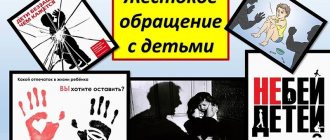Sometimes in practice there are non-standard offenses, such as insults of a minor child by an adult. However, often in such situations, children become the initiators of conflict, believing that due to their age no one will dare to touch them.
In this article we will consider the amount of responsibility for this act, the procedure for bringing the perpetrator to justice, as well as the procedure for resolving the conflict on the part of the offender.
Important! If you are dealing with your own case of child abuse, you should remember that:
|
Insult concept
Insulting a minor is a humiliation of the honor and dignity of a child by offenders (adults or other children). Unlike ordinary conversation in a raised voice, an insult involves an indecent form, a violation of etiquette and social norms. Often this form is expressed in the use of obscene language, from which, alas, not a single modern person is immune. Sometimes attacks involve comparing a child with an animal or object - which in itself is a violation of constitutional norms.
So, the features of insulting a minor are as follows:
- Use of abusive language;
- Suppression of the child’s psychological state;
- Physical impact;
- The presence of direct or indirect threats in speech;
- Other manifestations of rudeness.
Attention! Need a lawyer's protection? in the form, go to the free legal consultation , go, free !
You can often find debates about what can be considered an insult and what cannot? The question is, indeed, quite ambiguous: on the one hand, the offender can show disagreement with the actions of his opponent, point out his mistakes, and express his own opinion, albeit emotionally. On the other hand, even during communication in a raised voice, one should not cross the line of personal hostility towards a person. Therefore, if swear words, incorrect comparisons, or ridiculing the traits of another person are used in a discussion, this can be classified as an attack on honor and dignity.
How to change your style of communication with your child?
One way or another, most experts agree that it is under no circumstances possible to remain indifferent in a situation where a child is experiencing psychological trauma. Parents should strive to find ways to understand and build good relationships. The first step may be to recognize the need for change. The further action plan may consist of the following steps:
- Working on your own psychological health. Daily routine, proper nutrition, healthy lifestyle, hobbies, relaxation.
- Awareness of what irritates you most in a child, at what moments this happens, what is the “trigger mechanism”.
- An attempt to stop oneself at the moment of an aggressive reaction. This is certainly much easier said than done. Every time you manage to express your dissatisfaction more gently, celebrate it and praise yourself.
- Finding activities during which you and your child will feel good and interesting together. This could be a walk together, watching an interesting program, going to the skating rink, or doing something creative. It would be great if such classes were first organized by an experienced teacher who could identify the child’s talents and strengthen the self-esteem of all family members. Gradually, these joyful and positive moments should become more numerous than negative ones.
Unfortunately, not all people can change their own behavior through willpower. Working with a psychologist, aimed at understanding your family history, the characteristics of your behavior, and developing new forms of relationships with your child can and will certainly become a new starting point in the life of your family and in the life of your children’s family.
Three years ago, a helpline for children, teenagers and their parents was launched in Russia. The professional psychologists working there try to help everyone in need by finding solutions in each specific situation. You can call the helpline from anywhere in Russia absolutely free at the number: 8 800 2000 122.
Types of insult to a minor
Among children and teenagers, personal grievances of minors are always present. Often this manifests itself in relation to physically or mentally weak children, enslaved in behavior, in a word - different from their peers.
Grievances can be represented by:
Personal enmity
Occurs among teenagers whose interests contradict each other. Hostility is usually expressed in verbal rudeness, indecent gestures, ridicule of the opponent’s qualities, etc.
National or religious motives
Humiliation of honor and dignity is accompanied by hostility to the traditions or religion of various faiths. Even if a child behaves appropriately, this may not stop the abusers.
Rudeness on the Internet
Being born into the world of information technology, children can also be harmed by social media. For example, if adults or peers post defamatory information or pictures of an immoral nature online with a hint about the identity of the victim.
Telephone attacks
Calling names, ridicule, rude statements towards a minor via landline or mobile phone.
When faced with the fact of insulting children, you should immediately take action against the offender. Moreover, it is much more effective to punish the guilty person according to the law than to respond to him with rudeness for rudeness. From this point of view, parents must explain to the minor that he is under protection and must correctly assess the situation.
Rough treatment - from my parents’ own childhood
“Parents always transfer the experience of their childhood to communicate with their child.
Stereotypes of aggressive behavior are very difficult to interrupt without outside help. The following scheme works: an annoying situation - an aggressive reaction - a feeling of guilt - an increase in the negative attitude towards oneself and towards the child - and now a “harmless” reason becomes an irritant, says Maria Kholodtsova. “We need to try to break this vicious circle.” Scientific research confirms that psychological trauma received in childhood has an impact on a person’s further development. Such children are more likely to experience difficulties in school learning and communication, and they may also be susceptible to depression.
According to statistics, psychologically traumatized children are more likely than others to behave aggressively. Moreover, frequent encounters in childhood with aggression from an adult can lead to a person constantly becoming a victim of someone else - circumstances or people. Childhood traumas influence the choice of ways to react in dangerous situations - the level of trust in oneself and the world around us as a whole decreases.
However, a number of researchers prove that every child has his own unique character. If for one person the traumas experienced in childhood serve as an incentive to be more resilient, flexible and psychologically stable, then for another, resentment towards parents will become the meaning of his whole life.
Responsibility for insulting a child
Starting to consider penalties for persons who have offended minors, we note that the law does not have a separate article for these cases. Offenses are classified under General Art. 5.61 Code of Administrative Offenses of the Russian Federation.
Administrative penalties:
Humiliation of honor and dignity without aggravating circumstances:
- Fine for ordinary citizens - up to 3 thousand rubles;
- Officials (for example, a school teacher) – up to 30 thousand rubles;
- Legal entities – up to 100 thousand rubles.
The presence of aggravating circumstances, for example, public slander or publication of defamatory information in the media, is punishable by:
- Imposing a fine on citizens from 3 to 50 thousand rubles;
- Officials will have to pay from 30 to 50 thousand rubles;
- Gross attacks by organizations will cost them a fine of 100 to 500 thousand rubles.
Thus, it is clearly seen that offending a minor is punishable by a fine. As judicial practice shows, the percentage of such cases in the total volume of proceedings is not very high. This is due to the fact that the courts are reluctant to consider claims under Art. 5.61 Code of Administrative Offenses of the Russian Federation.
Saying hurtful words
By saying hurtful words to make your child feel guilty, you deprive him of adequate self-esteem, rapidly reducing it. As a result, the child may grow up touchy and constantly feel guilty, and then become a frequent guest in the psychologist’s office.
Source: Unsplash
What to do if a minor is abused?
If you witness an adult or other children insulting a child, there is no need to shelve the matter. A complaint should be filed if verbal abuse has seriously damaged the mental state of a minor or affected his social status.
You can file a complaint at the nearest police station, prosecutor's office or directly to the court. Evidence is attached to the complaint. They may be of the following nature:
- Testimony (classmates, parents, neighbors, other eyewitnesses);
- Physical evidence (photo, audio, video);
- Written evidence (notes, threatening letters);
- Other materials (torn clothes, injuries).
In addition to the collected evidence, it will be necessary to convince the court that the minor suffered serious moral harm, lost his reputation in society and was under stress for a long time. If the case is won in the magistrate's court, the plaintiff may also recover moral compensation and legal costs from the offender.
Author of the article
Dmitry Leonov
Work experience 15 years, specialization - housing, family, inheritance, land, criminal cases.
Author's rating
721
Articles written
712
about the author
Useful information on criminal cases
- Prosecution for libel
- Article for libel on the Internet
- False report of rape
- Defense against libel
- Charge of libel
- Theft accusation without evidence
- Sue for personal insult
- Personal insult complaint
- Fine for libel
- Liability for slander of an official
- Violent actions - Article 132 of the Criminal Code of the Russian Federation
- If the boss yells and humiliates: where to complain?
- Insulting a minor child: article
- Neighbor threatens violence: what to do
- Responsibility for violation of confidentiality of correspondence
- Libel lawsuit
- Punishment for public insult to a person
- Does a teacher have the right to insult a student?
- Infringement of the rights of minor children
- Attempted rape
- Blackmail on the Internet - Article 163 of the Criminal Code of the Russian Federation
- Rape charge
- Responsibility for non-payment of wages
- Criminal liability for violation of privacy
- What to do if you receive threats over the phone
- Punishment for knowingly false testimony
- Sample statement about threat to life
- Insulting a police officer while on duty
How can you tell if your child is having problems at school?
Unfortunately, not all children and parents develop trusting relationships, and therefore in conflict situations at school or simply between peers, the child will most likely remain silent.
The situation can be aggravated by the parent himself - “this is just a school conflict, the child must solve it himself, if I interfere, it will only get worse” or “there is a teacher, let him sort it out.” A child psychologist will tell you in detail what all this can ultimately lead to.
Clear signs that a child is being abused at school may include the following:
- The child does not want to go to school, and this has never been noticed before. A student can look for any excuse to stay at home.
- The child comes home from school in a bad mood and depressed state.
- Academic performance has deteriorated sharply.
- Often “loses” personal belongings, including pocket money.
- It is not uncommon for a child to come home from school in torn, dirty clothes, and there may also be abrasions.
At home, the student’s behavior also changes: character traits may appear that were previously not characteristic of him, he becomes withdrawn, silent, and does not readily answer questions “how are things at school.”
In general, any changes in a child’s behavior should not go unnoticed by parents. The sooner a problem is detected and steps are taken to correct it, the better.
Personal insult. Where to contact?
How to punish a person for insulting? To do this, it is necessary to understand what the legal phenomenon of “insult” is and what is included in its definition.
According to Article 130 of the Criminal Code, which for a long time was the legislator in determining responsibility, punishment, and also gave characteristics of the act, an insult includes an indecent action towards the victim.
That is, the perpetrator may verbally express, in the presence of third parties, an obscene phrase addressed to the victim, or otherwise behave indecently.
On this basis, a citizen has the opportunity to seek legal protection:
- to the police station;
- to the prosecutor's office;
- to court.
The choice of authority depends on:
- What are the relationships between the conflicting persons?
- At what stage is the trial process at a certain moment?
- What evidence of guilt does the victim have?









